英语口语:你一定会误解的42个英语句子
中国人最易误解的45句英语
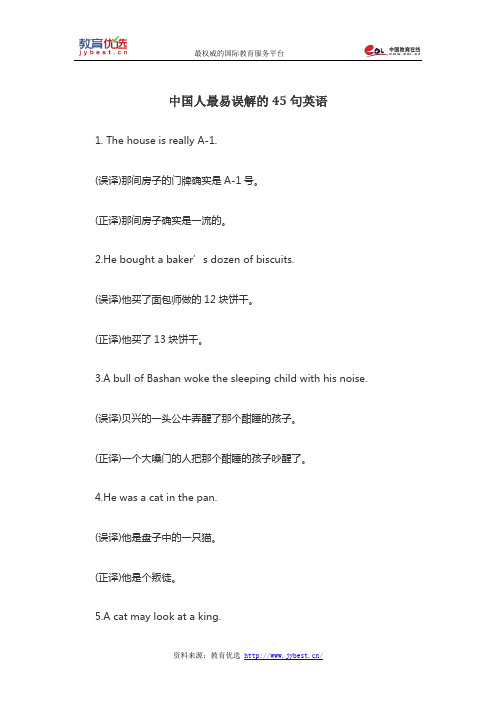
中国人最易误解的45句英语1. The house is really A-1.(误译)那间房子的门牌确实是A-1号。
(正译)那间房子确实是一流的。
2.He bought a baker’s dozen of biscuits.(误译)他买了面包师做的12块饼干。
(正译)他买了13块饼干。
3.A bull of Bashan woke the sleeping child with his noise. (误译)贝兴的一头公牛弄醒了那个酣睡的孩子。
(正译)一个大嗓门的人把那个酣睡的孩子吵醒了。
4.He was a cat in the pan.(误译)他是盘子中的一只猫。
(正译)他是个叛徒。
5.A cat may look at a king.(误译)一只猫都可以看到国王。
(正译)小人物也该有同等权利。
6.Even a hair of dog didn’t make him feel better. (误译)即使一根狗毛也不会使他觉得好些。
(正译)即使是再喝解宿醉的一杯酒,也不会使他觉得好些。
7.Is he a Jonah?(误译)他就是叫约拿吗?(正译)他是带来厄运的人吗?8.Jim is fond of a leap in the dark.(误译)吉姆喜欢在黑暗处跳跃。
(正译)吉姆喜欢冒险行事。
9.A little bird told me the news.(误译)一只小鸟将此消息告诉我。
(正译)消息灵通的人士将此消息告诉我。
10.Angela is a man of a woman.(误译)安吉拉是个有妇之夫。
(正译)安吉拉是个像男人的女人。
11.Nellie is a man of his word.(误译)内莉是他所说的那个人。
(正译)内莉是个守信用的人。
12.He paid a matter of 1000 yuan.(误译)他付了1000元的货物账。
(正译)他大约付了1000元。
英语表达中常被人误解的话

口语中常犯的错误,你这样说过吗?日常英语口语中,我们很多人都会犯一些语法方面的错误,如:我没有男朋友。
错误的说法是I have no boyfriend。
应该说I don’t have a boyfriend,还有哪些呢?一起来看看,你中招了没。
1. 末班车11点开,现在已经快11点了,赶紧的!×The last bus leaves at eleven o'clock. It's about eleven now, Hurry!√ The last bus leaves at eleven o'clock. It's nearly(almost) eleven now, Hurry!2. 把手从电线末端挪开。
×Leave your hand from the end of the wire.√Let go of the end of the wire.3. 不关你的事。
×It is not of only your business.√ It is none of your business.4. 我就是这样做的。
×This is the way how I did it.√This is how I did it. or This is the way I did it.5. 我来这儿的路上遇到了交通事故,所以迟到了。
×There was a traffic accident on my way here. It is why I was late.√ There was a traffic accident on my way here. That is why I was late.6. 他们不理解我的想法。
×hey didn't understand my mind.√ They didn't understand what I was thinking.7. 去哪儿都行。
英语口语学习中容易误解的句子
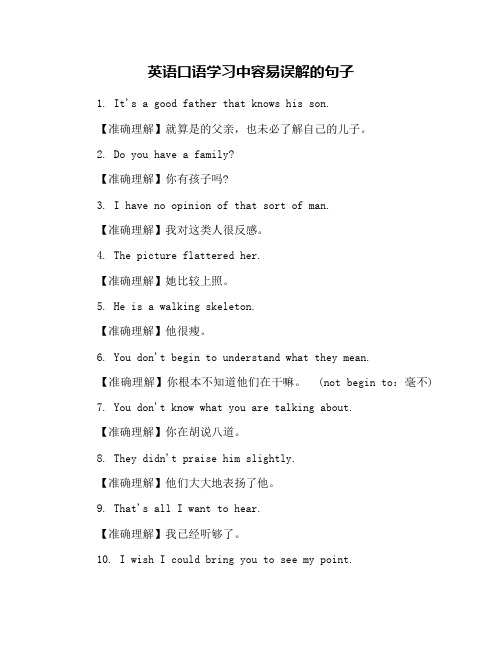
英语口语学习中容易误解的句子1. It's a good father that knows his son.【准确理解】就算是的父亲,也未必了解自己的儿子。
2. Do you have a family?【准确理解】你有孩子吗?3. I have no opinion of that sort of man.【准确理解】我对这类人很反感。
4. The picture flattered her.【准确理解】她比较上照。
5. He is a walking skeleton.【准确理解】他很瘦。
6. You don't begin to understand what they mean.【准确理解】你根本不知道他们在干嘛。
(not begin to:毫不) 7. You don't know what you are talking about.【准确理解】你在胡说八道。
8. They didn't praise him slightly.【准确理解】他们大大地表扬了他。
9. That's all I want to hear.【准确理解】我已经听够了。
10. I wish I could bring you to see my point.【准确理解】你要我怎么说你才能明白呢。
11. You really flatter me.【准确理解】你让我受宠若惊。
12. He made a great difference.【准确理解】他很关键。
13. You cannot give him too much money.【准确理解】你给他再多的钱也不算多。
(not…too/over…连用表示“再…也不为过”)14. The long exhausting trip proved too much.【准确理解】这次旅行旷日持久,我们都累倒了。
15. She held the little boy by the right hand.【准确理解】她抓着小男孩的右手。
容易误会的英语情景交际用语

容易误会的英语情景交际用语在英语情景交际中,有些用语可能会因为文化差异或语境不同而容易引发误会。
以下是一些常见的容易误会的英语情景交际用语及其解释:1.“How are you?”●误解:很多人可能会直接回答“I'm fine”或者“I'm good”,但在很多英语母语者的日常交流中,这只是一个问候语,不一定需要详细回答。
●正确理解:通常这是一个礼貌的问候,不需要深入的回答,除非对方明显想要进一步的交流。
2.“You're welcome!”●误解:在某些文化中,人们可能会误以为“You're welcome!”是对方表示感谢后唯一正确的回应。
●正确理解:这只是一个礼貌的回应,你也可以用“No problem”或者“Don't mention it”等来表达同样的意思。
3.“Thank you for your help.”●误解:当别人提供帮助时,如果不接受帮助,有些人可能会误以为不需要表示感谢。
●正确理解:即使你不需要帮助或者已经自己解决了问题,也要表示感谢,因为对方的好意值得肯定。
4.“Small talk”●误解:在一些文化中,直接谈论私人问题或深入话题被视为真诚,但在许多英语国家,人们可能更倾向于谈论日常琐事或天气等轻松的话题。
●正确理解:小聊天(small talk)是建立关系、缓解紧张气氛的一种方式,不一定要深入或严肃。
5.“I'm sorry.”●误解:这个短语有时会被误解为仅仅是对错误或失误的道歉,但实际上它也可以用来表达同情或遗憾。
●正确理解:这个短语有多种用途,不仅仅是对自己行为的道歉,也可以用来表达对他人的同情或理解。
6.“No problem!”●误解:在某些情况下,这个短语可能会被误解为对方完全没有问题或困难。
●正确理解:这通常意味着对方愿意提供帮助,或者对某事表示不介意。
7.“That's OK.”●误解:这个短语有时会被误解为对方完全满意或同意某事。
最容易被错误理解的英语句子118句
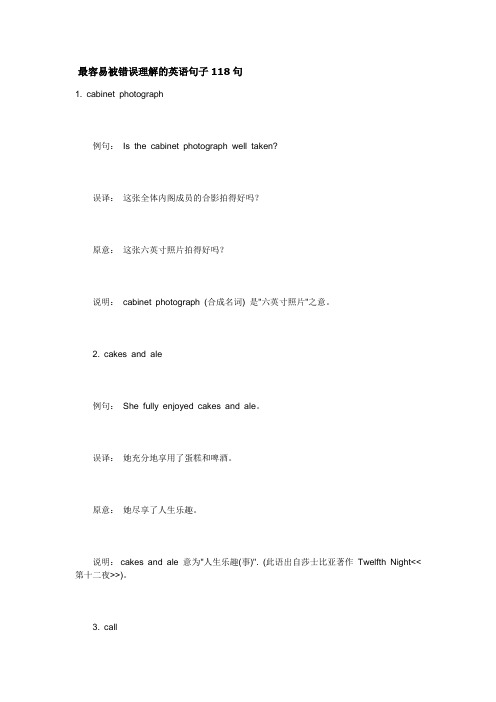
最容易被错误理解的英语句子118句1. cabinet photograph例句:Is the cabinet photograph well taken?误译:这张全体内阁成员的合影拍得好吗?原意:这张六英寸照片拍得好吗?说明:cabinet photograph (合成名词) 是"六英寸照片"之意。
2. cakes and ale例句:She fully enjoyed cakes and ale。
误译:她充分地享用了蛋糕和啤酒。
原意:她尽享了人生乐趣。
说明:cakes and ale 意为"人生乐趣(事)". (此语出自莎士比亚著作Twelfth Night<<第十二夜>>)。
3. call例句:He has no call to flare up。
误译:他没有发怒大叫。
原意:他没有必要发怒。
说明:本例的call (名词),意为"必要","理由". 作此解时一般用于否定句和疑问句。
4. call one names例句:My grandpa told me not to call him names。
误译:我爷爷告诉我不要叫他的名字。
原意:我爷爷叫我不要骂他。
说明:call one names 意为"辱骂某人",用于口语. 值得注意的是,one 一定要用宾格,而不是所有格,即不是one's. "names" 一定是复数"names", 否则就不是此意. 如上例,若该成My grandpa told me not to call his name. 则是"我爷爷叫我不要叫他的名字". call one's name 中的name 根据情况,可用单数和复数。
5. can例句:Buy up all the pineapples! We can can them。
英语口语中容易犯的失误和误解的句子

英语口语中容易犯的失误和误解的句子英语中有些句子,乍看起来很简单,但是其中的某些词汇和搭配的可能跟常见的意义相去甚远,这时可千万不能望文生义哦!本文为大家总结了英语口语中容易犯的失误和误解的句子,赶快记下来吧!英语口语中容易犯的失误:1. I very like itI like it very much.2. 这个价格对我挺合适的。
The price is very suitable for me.The price is right.Note:suitable(合适的、相配的)最常见的用法是以否定的形式出现在告示或通知上,如:下列节目儿童不宜。
The following programme is not suitable for children在这组句子中用后面的说法会更合适。
3. 你是做什么工作的呢?What's your job?Are you working at the moment?Note:what's your job这种说法难道也有毛病吗?是的。
因为如果您的谈话对象刚刚失业,如此直接的问法会让对方有失面子,所以您要问:目前您是在上班吗?Are you wor king at the moment?接下来您才问:目前您在哪儿工作呢?Where are you working thes e days?或者您从事哪个行业呢?What line of work are you in?顺带说一下,回答这类问题时不妨说得具体一点,不要只是说经理或者秘书。
4. 用英语(论坛)怎么说?How to say?How do you say this in English?Note:How to say是在中国最为泛滥成灾的中国式英语之一,这决不是地道的英语说法。
同样的句子有:请问这个词如何拼写?How do you spell that please?请问这个单词怎么读?How do you pronounce this word?5. 明天我有事情要做。
很简单却容易被误会的12句英语口语,千万别说错了!

很简单却容易被误会的12句英语口语,千万别说错了!今天和大家说说一些单词语法都非常简单,但意思却经常被人误会的口语常用句子。
1.I could use the bathroom.我要上洗手间could use在口语里还经常表示需要的意思=needI could use some help. 我需要帮忙I could use a cup of coffee. 给我来杯咖啡2.tell me about it可不是嘛'Working overtime is really frustrating.''Tell me about it.'这里的tell me about it 并不是让你告诉我工作具体怎么让你郁闷。
tell me about it在口语里还有另外个高频用法表示对方说的事情或者经历你有同感(通常是不愉快的经历)和中文里的“可不是嘛”意思一样。
3.I'm a people person.我是个擅长社交的人千万别以为是我不小心多打了个people.4.You're dressed to kill.你今天打扮的好漂亮特别惹眼记得多年前有次在办公室看见女同事一身黑色上衣和裤子特别惹眼,我就用了这句话,同事回道:是嘛,我妈妈也这么说我,一身黑色,感觉要去杀人一样...这句话意思是表示穿着打扮很漂亮,偏向于特别惹眼性感的那种,对异性很有吸引力。
5.It shows.这很明显美剧里经常见到这句话,是不是比It's obvious更简单?6.I can tell.我看的出来'Jerry's English is great.“” I can tell.'后面也可以接从句 I can tell (that) Jerry's English is good.7.What's your take on it?你怎么看?take还可以做名词=opinion8.so help me (God)我发誓,上帝作证So help me God, I'll beat the hell out of you if you don't behave.我发誓如果你不老实点的话我揍不死你!千万不要直接翻译成“所以上帝帮帮我吧”。
5容易引起误解的句子
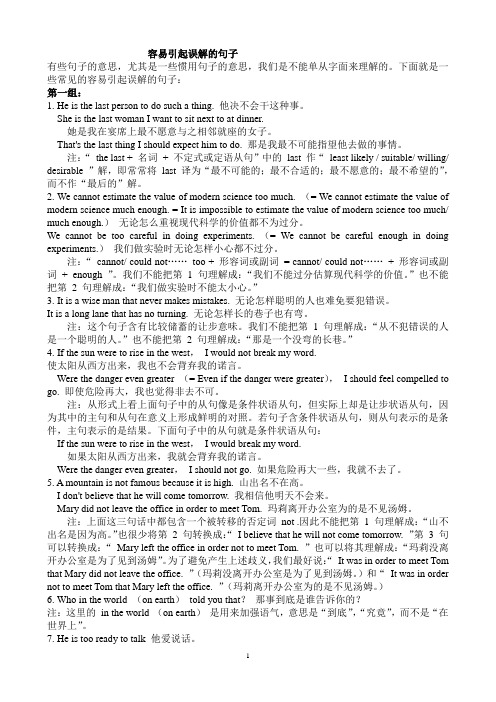
容易引起误解的句子有些句子的意思,尤其是一些惯用句子的意思,我们是不能单从字面来理解的。
下面就是一些常见的容易引起误解的句子:第一组:1. He is the last person to do such a thing. 他决不会干这种事。
She is the last woman I want to sit next to at dinner.她是我在宴席上最不愿意与之相邻就座的女子。
That's the last thing I should expect him to do. 那是我最不可能指望他去做的事情。
注:“the last + 名词+ 不定式或定语从句”中的last 作“least likely / suitable/ willing/ desirable ”解,即常常将last 译为“最不可能的;最不合适的;最不愿意的;最不希望的”,而不作“最后的”解。
2. We cannot estimate the value of modern science too much. (= We cannot estimate the value of modern science much enough. = It is impossible to estimate the value of modern science too much/ much enough.)无论怎么重视现代科学的价值都不为过分。
We cannot be too careful in doing experiments. (= We cannot be careful enough in doing experiments.)我们做实验时无论怎样小心都不过分。
注:“cannot/ could not……too + 形容词或副词= cannot/ could not……+ 形容词或副词+ enough ”。
我们不能把第 1 句理解成:“我们不能过分估算现代科学的价值。
你一定会误解的42个英语句子
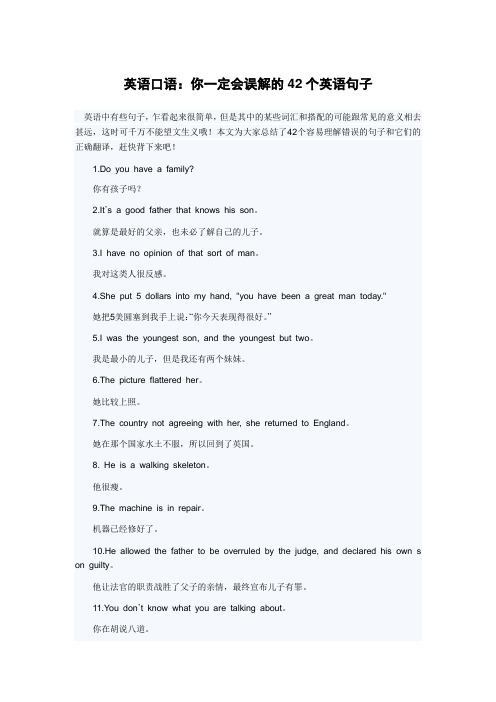
英语口语:你一定会误解的42个英语句子英语中有些句子,乍看起来很简单,但是其中的某些词汇和搭配的可能跟常见的意义相去甚远,这时可千万不能望文生义哦!本文为大家总结了42个容易理解错误的句子和它们的正确翻译,赶快背下来吧!1.Do you have a family?你有孩子吗?2.It’s a good father that knows his son。
就算是最好的父亲,也未必了解自己的儿子。
3.I have no opinion of that sort of man。
我对这类人很反感。
4.She put 5 dollars into my hand, "you have been a great man today."她把5美圆塞到我手上说:“你今天表现得很好。
”5.I was the youngest son, and the youngest but two。
我是最小的儿子,但是我还有两个妹妹。
6.The picture flattered her。
她比较上照。
7.The country not agreeing with her, she returned to England。
她在那个国家水土不服,所以回到了英国。
8. He is a walking skeleton。
他很瘦。
9.The machine is in repair。
机器已经修好了。
10.He allowed the father to be overruled by the judge, and declared his own s on guilty。
他让法官的职责战胜了父子的亲情,最终宣布儿子有罪。
11.You don’t know what you are talking about。
你在胡说八道。
12.You don’t begin to understand what they mean。
容易引起误解的英语句子

容易引起误解的英语句子有些句子的意思,尤其是一些惯用句子的意思,我们是不能单从字面来理解的。
下面就是一些常见的容易引起误解的句子:1. He is the last person to do such a thing. 他决不会干这种事。
She is the last woman I want to sit next to at dinner.她是我在宴席上最不愿意与之相邻就座的女子。
That's the last thing I should expect him to do. 那是我最不可能指望他去做的事情。
注:“the last + 名词+ 不定式或定语从句”中的last 作“least likely / suitable/ willing/ desirable ”解,即常常将last 译为“最不可能的;最不合适的;最不愿意的;最不希望的”,而不作“最后的”解。
2. We cannot estimate the value of modern science too much. (= We cannot estimate the value of modern science much enough. = It is impossible to estimate the value of modern science too much/ much enough.)无论怎么重视现代科学的价值都不为过分。
We cannot be too careful in doing experiments. (= We cannot be careful enough in doing experiments.)我们做实验时无论怎样小心都不过分。
注:“cannot/ could not……too + 形容词或副词= cannot/ could not……+ 形容词或副词+ enough ”。
我们不能把第1 句理解成:“我们不能过分估算现代科学的价值。
容易被误解的42个英语口语句子

容易被误解的42个英语口语句子1.Do you have a family?你有孩子吗?2.It’s a good father that knows his son。
就算是的父亲,也未必了解自己的儿子。
3.I have no opinion of that sort of man。
我对这类人很反感。
4.She put 5 dollars into my hand, "you have been a great man today."她把5美圆塞到我手上说:“你今天表现得很好。
”5.I was the youngest son, and the youngest but two。
我是最小的儿子,但是我还有两个妹妹。
6.The picture flattered her。
她比较上照。
7.The country not agreeing with her, she returned to England。
她在那个国家水土不服,所以回到了英国。
8. He is a walking skeleton。
他很瘦。
9.The machine is in repair。
机器已经修好了。
10.He allowed the father to be overruled by the judge, and declared his own son guilty。
他让法官的职责战胜了父子的亲情,最终宣布儿子有罪。
11.You don’t know what you are talking about。
你在胡说八道。
12.You don’t begin to unders tand what they mean。
你根本不知道他们在干嘛。
(don’t begin :决不)13.They didn’t praise him slightly。
他们大大地表扬了他。
14.That’s all I want to hear。
你绝对会会错意的22句英文

1、pull one’s leg 开玩笑(不是“拉后腿”)2、in one’s birthday suit 赤身裸体(不是“穿着生日礼服”)3、eat one’s words 收回前言(不是“食言”)4、an apple of love 西红柿(不是“爱情之果”)5、handwriting on the wall 不祥之兆(不是“大字报”)6、bring down the house 博得全场喝彩(不是“推倒房子”)7、have a fit 勃然大怒(不是“试穿”)8、make one’s h air stand on end 令人毛骨悚然—恐惧(不是“令人发指——气愤”)9、be taken in 受骗,上当(不是“被接纳”)10、think a great deal of oneself 高看或看重自己(不是“为自己想得很多”)11、pull up one’s socks 鼓起勇气(不是“提上袜子”)12、have the heart to do (用于否定句)忍心做……不是“有心做”或“有意做”)13、Look out! 当心!(不是“向外看”)14、What a shame! 多可惜!真遗憾!(不是“多可耻”)15、You don’t say! 是吗!(不是“你别说”)16、You can say that again! 说得好!(不是“你可以再说一遍”)17、I haven’t slept better. 我睡得好极了。
(不是“我从未睡过好觉”)18、You can’t be too careful in your work. 你工作越仔细越好。
(不是“你工作不能太仔细”)19、It has been 4 years since I smoked. 我戒烟4年了。
(不是“我抽烟4年了”)20、All his friends did not turn up. 他的朋友没全到。
(不是“他的朋友全没到”)21、People will be long forgetting her. 人们在很长时间内会记住她的。
容易产生歧义的英语句子

容易产生歧义的英语句子1. "I saw her duck."这句话可能产生歧义,因为它有两个可能的含义,一是“我看到了她躲避”,二是“我看到了她的鸭子”。
1. I saw her duck and it was so cute. (我看到了她的鸭子,很可爱。
)2. I saw her duck and she quickly moved out of the way. (我看到她躲开了。
)3. The hunter saw the duck fly away. (猎人看到鸭子飞走了。
)4. The waitress saw the duck in the pond. (女服务员看到了池塘里的鸭子。
)5. I saw her duck and realized it was a decoy. (我看到了她的鸭子,发现它是一个诱饵。
)6. He saw the duck-headed cane and thought it was a real duck. (他看到鸭头手杖,以为是真的鸭子。
)7. She saw the duck-shaped cloud in the sky. (她看到了天空中鸭子形状的云。
)8. The chef saw the duck on the menu and immediately started to prepare it. (厨师看到菜单上的鸭子,立刻开始准备。
)2. "I'm sorry. I love you."这句话也有两种可能的含义,一是“我很抱歉”,二是“我爱你”。
1. I'm sorry, I love you. (我很抱歉,我爱你。
)2. I can say I'm sorry, but I can never say I love you enough. (我可以说我很抱歉,但我永远无法表达出我对你的爱。
容易产生误解的句子

容易产生误解的句子
如果有一天一个外国朋友跟你说了一个劲爆消息。
于是你问他从哪里听到的,他说:"Alittlebirdtoldme."什幺?小鸟告诉的?如果你这幺想,那可就闹笑话啦!来看看这些最容易理解错误的话吧!
1、Alittlebirdtoldmethenews.
【误解】一只小鸟将此消息告诉我。
【原意】消息灵通人士告诉我这个消息的。
【说明】alittlebirdtoldme是口语,意为“消息灵通人士告诉我,有人私下告诉我”。
2、ThathouseisreallyA-1.
【误译】那间房子的门牌确实是A-1号。
【原意】那间房子确实是一流的。
【说明】A-1,也作A1(形容词),意为“头等的,一流的,挺
好的,最优秀的”。
3、IsheaJonah?
【误译】他叫约拿吗?【原意】他是带来厄运的人吗?
【说明】aJonah喻意为“带来厄运的人”。
4、Jimisfondofaleapinthedark.
【误译】吉姆喜欢在黑暗处跳跃。
【原意】吉姆喜欢冒险行事。
【说明】aleapinthedark是习语(名词短语),意为“冒险行事,轻举妄动”。
【小升初资料】英语中容易误解的句子80例(上)

英语中容易误解的句子80例(上)1.I don’t like black coffee.误:我不喜欢黑咖啡。
正:我不喜欢浓咖啡。
(不加牛奶和糖的咖啡)2.She likes white coffee.误:她不喜欢白咖啡。
正:他喜欢加牛奶的咖啡。
3.You have been a great man today.误:你今天是个好人。
正:你今天表现的很好。
4.We are going to buy some dry goods.误:我们将要买一些干货。
正:我们将要买一些纺织品(美语)/谷物(英语)。
5.People can’t live without sweet water.误:没有甜水人们无法生存。
正:没有淡水人们无法生存。
6.He is a bad sailor.误:他是一名坏水手。
正:他是一名常晕船的人。
7.His mother is a busybody.误:他母亲是一位大忙人。
正:他母亲是一位爱管闲事的人。
8.Tom is the black sheep of his family.误:汤姆是他们家的一只黑羊。
正:汤姆是个败家子。
9.The car you bought yesterday is a white elephant.误:你昨天买的那辆车像是一头白象。
正:你昨天买的那辆车像是个累赘无用的东西。
10.Her father is a small potato.误:他父亲是个小土豆。
正:他父亲是个小人物。
11.It’s duck soup to me.误:这对我来说就是鸭汤。
正:对我来说,这易如反掌。
12.He is an ill man.误:他是一位病人。
正:他是一个坏人。
13.I’m not a bit afraid..误:我一点儿也不害怕。
正:我非常害怕。
14.I’m not a bit tired.误:我非常累。
正:我一点儿也不累。
注意not a little = very much (非常),not a bit = not at all (一点也不)。
极易误解英语习语
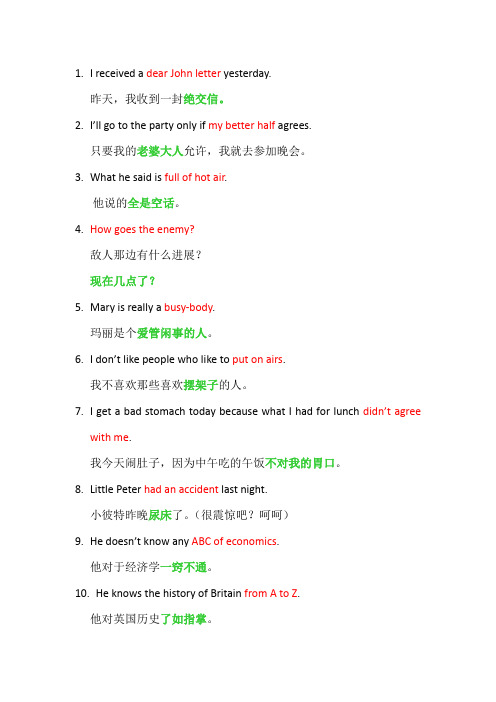
1.I received a dear John letter yesterday.昨天,我收到一封绝交信。
2.I’ll go to the party only if my better half agrees.只要我的老婆大人允许,我就去参加晚会。
3.What he said is full of hot air.他说的全是空话。
4.How goes the enemy?敌人那边有什么进展?现在几点了?5.Mary is really a busy-body.玛丽是个爱管闲事的人。
6.I don’t like people who like to put on airs.我不喜欢那些喜欢摆架子的人。
7.I get a bad stomach today because what I had for lunch didn’t agreewith me.我今天闹肚子,因为中午吃的午饭不对我的胃口。
8.Little Peter had an accident last night.小彼特昨晚尿床了。
(很震惊吧?呵呵)9.He doesn’t know any ABC of economics.他对于经济学一窍不通。
10.He knows the history of Britain from A to Z.他对英国历史了如指掌。
11.In the final analysis, profit is the motive.归根到底,利润才是动机。
12.Here is mud in your eye.干杯!祝您身体健康。
(酒席上别人讲到这句话千万不要误解!!!)13.Oh, you are all wet.哦,你全错了。
14.He gets my goat, and I’m going to get even some day.他有意为难我,总有一天我要以牙还牙。
15.John is going to tie the knot in Autumn.约翰准备秋天结婚。
口语中容易理解错的英语句子

口语中容易理解错的英语句子1.Do you have a family? 你有孩子吗?2.It's a good father that knows his son.就算是最好的父亲,也未必了解自己的儿子。
3.I have no opinion of that sort of man. 我对这类人很反感。
4.He put 5 dollars into my hand,"you have been a great man today." 他把5美圆塞到我手上说:“你今天表现得很好。
”5.I was the youngest son,and the youngest but two. 我是最小的儿子,但我还有两个妹妹。
6.The picture flattered her. 她比较上照。
7.The country not agreeing with her, she returned to England. 她在那个国家水土不服,所以回到了英国。
8.He is a walking skeleton. 他很瘦。
9.The machine is in good repair. 机器已经修好了。
10.He allowed the father to be overruled by the judge, and declared his own son guilty. 他让法官的职责战胜了父子的亲情,最终宣布儿子有罪。
11.You don't know what you are talking about. 你在胡说八道。
12.You don't begin tounderstand what they mean. 你根本不知道他们在干嘛。
(not begin to:毫不)13.They didn't praise him slightly. 他们大大地表扬了他。
容易误解的口语

容易误解的口语sporting house 妓院(不是“体育室”)dead president 美钞(上印有总统头像)(并非“死了的总统”)lover 情人(不是“爱人”)busboy 餐馆勤杂工(不是“公汽售票员”)busybody 爱管闲事的人(不是“大忙人”)dry goods (美)纺织品;(英)谷物(不是“干货”)heartman 换心人(不是“有心人”)mad doctor 精神病科医生(不是“发疯的医生”)eleventh hour 最后时刻(不是“十一点”)blind date (由第三者安排的)男女初次会面(并非“盲目约会”或“瞎约会”)personal remark 人身攻击(不是“个人评论”)sweet water 淡水(不是“糖水”或“甜水”)confidence man 骗子(不是“信得过的人”)criminal lawyer 刑事律师(不是“犯罪的律师”)service station 加油站(不是“服务站”)rest room 厕所(不是“休息室”)dressing room 化妆室(不是“试衣室”或“更衣室”)horse sense 常识(不是“马的感觉”)capital idea 好主意(不是“资本主义思想”)familiar talk 庸俗的交谈(不是“熟悉的谈话”)black tea 红茶(不是“黑茶”)black art 妖术(不是“黑色艺术”)black stranger 完全陌生的人(不是“陌生的黑人”)white coal (作动力来源用的)水(不是“白煤”)white man 忠实可靠的人(不是“皮肤白的人”)yellow book 黄皮书(法国政府报告书,以黄纸为封)(不是“黄色书籍”)red tape 官僚习气(不是“红色带子”)green hand 新手(不是“绿手”)blue stocking 女学者、女才子(不是“蓝色长统袜”)China policy 对华政策(不是“中国政策”)Chinese dragon 麒麟(不是“中国龙”)American beauty 一种玫瑰,名为“美国丽人”(不是“美国美女”)English disease 软骨病(不是“英国病”)Indian summer 愉快宁静的晚年(不是“印度的夏日”)Greek gift 害人的礼品(不是“希腊礼物”)Spanish athlete 吹牛的人(不是“西班牙运动员”)French chalk 滑石粉(不是“法国粉笔”)pull one’s leg 开玩笑(不是“拉后腿”)in one’s birthday suit 赤身裸体(不是“穿着生日礼服”)eat one’s words 收回前言(不是“食言”)an apple of love 西红柿(不是“爱情之果”)handwriting on the wall 不祥之兆(不是“大字报”)bring down the house 博得全场喝彩(不是“推倒房子”)have a fit 勃然大怒(不是“试穿”)make one’s hair stand on end 令人毛骨悚然—恐惧(不是“令人发指——气愤”)be taken in 受骗,上当(不是“被接纳”)think a great deal of oneself 高看或看重自己(不是“为自己想得很多”)pull up one’s socks 鼓起勇气(不是“提上袜子”)have the heart to do (用于否定句)忍心做……不是“有心做”或“有意做”)What a shame! 多可惜!真遗憾!(不是“多可耻”)You don’t say! 是吗!(不是“你别说”)You can say that again! 说得好!(不是“你可以再说一遍”)I haven’t slept better. 我睡得好极了。
- 1、下载文档前请自行甄别文档内容的完整性,平台不提供额外的编辑、内容补充、找答案等附加服务。
- 2、"仅部分预览"的文档,不可在线预览部分如存在完整性等问题,可反馈申请退款(可完整预览的文档不适用该条件!)。
- 3、如文档侵犯您的权益,请联系客服反馈,我们会尽快为您处理(人工客服工作时间:9:00-18:30)。
英语口语:你一定会误解的42个英语句子
1.Do you have a family?
你有孩子吗?
2.It’s a good father that knows his son。
就算是的父亲,也未必了解自己的儿子。
3.I have no opinion of that sort of man。
我对这类人很反感。
4.She put 5 dollars into my hand, "you have been a great man today."
她把5美圆塞到我手上说:“你今天表现得很好。
”
5.I was the youngest son, and the youngest but two。
我是最小的儿子,但是我还有两个妹妹。
6.The picture flattered her。
她比较上照。
7.The country not agreeing with her, she returned to England。
她在那个国家水土不服,所以回到了英国。
8. He is a walking skeleton。
他很瘦。
9.The machine is in repair。
机器已经修好了。
10.He allowed the father to be overruled by the judge, and declared his own son guilty。
他让法官的职责战胜了父子的亲情,最终宣布儿子有罪。
11.You don’t know what you are talking about。
你在胡说八道。
12.You don’t begin to understand what they mean。
你根本不知道他们在干嘛。
(don’t begin :决不)
13.They didn’t praise him slightly。
他们大大地表扬了他。
14.That’s all I want to hear。
我已经听够了。
15.I wish I could bring you to see my point。
你要我怎么说你才能明白呢。
16.You really flatter me。
你让我受宠若惊。
17.He made a great difference。
有他没他结果完全不一样。
18.You cannot give him too much money。
你给他再多的钱也不算多。
19.The long exhausting trip proved too much。
这次旅行矿日持久,我们都累倒了。
20.The monk is only not a dead man。
这个和尚虽然活着,但跟死了差不多。
21.A surgeon made a cut in the patient’s stomach。
外科医生在病人胃部打了个洞。
22.You look darker after the holiday。
你看上去更健康了。
23.As luck would have it, he was caught by the teacher again。
不幸的是,他又一次被老师逮个正着
24.She held the little boy by the right hand。
她抓着小男孩的右手。
(若将"by"换成"with",则动作主语完全相反。
)
25.Are you there?
等于句型:Do you follow me?
26.If you think he is a good man, think again。
如果你认为他是好人,那你就大错特错了。
27.She has blue eyes。
她长着双蓝眼睛。
28.That took his breath away。
他大惊失色。
29.Two is company but three is none。
两人成伴,三人不欢。
